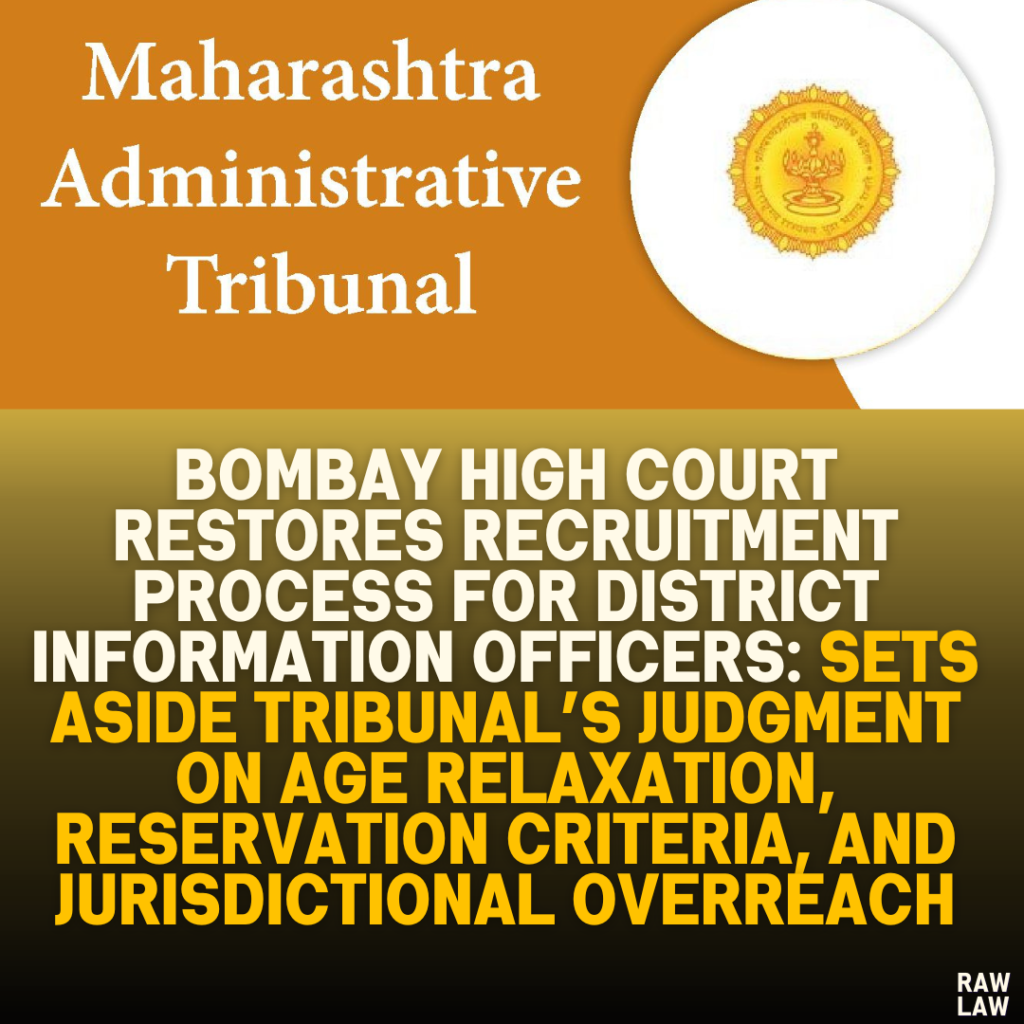1. Court’s Decision
The Bombay High Court overturned the Maharashtra Administrative Tribunal’s (MAT) decision that had quashed the recruitment process for District Information Officers (Group-A, Junior). The High Court found that:
- The MAT had exceeded its jurisdiction.
- It erred in assessing the comparative qualifications of candidates and in deciding on the issue of age relaxation.
- The Tribunal wrongly directed the state government to reinitiate the recruitment process.
2. Facts of the Case
- The Recruitment Advertisement:
- The Maharashtra Directorate of Information and Public Relations issued Advertisement No.2 of 2008 for recruiting District Information Officers.
- The advertisement included four open category posts: three reserved for women and one for sportspersons.
- The Aggrieved Candidate:
- A candidate over the prescribed age limit (35 years) applied, claiming age relaxation under Rule 7 of the Recruitment Rules, 1994.
- His application for age relaxation was rejected by the Selection Committee, which concluded he did not have “exceptional qualifications or experience.”
- Initial Participation and Withdrawal:
- The candidate participated in the written exam through an interim order but withdrew his writ petition, opting to approach the Tribunal later.
- MAT’s Judgment:
- The MAT found issues with the reservation process, age relaxation, and non-verification of documents. It set aside the recruitment process and directed a fresh selection process.
3. Issues Before the Court
- Did the aggrieved candidate qualify for age relaxation under Rule 7 of the Recruitment Rules, 1994?
- Was the MAT justified in setting aside the recruitment process based on procedural irregularities?
- Did the Tribunal overstep its jurisdiction by assessing qualifications and age relaxation?
4. Petitioner’s Arguments (State and Selected Candidates)
- Challenge to Jurisdiction:
- The Tribunal exceeded its powers by substituting its judgment for that of the Selection Committee, which is the competent body to evaluate candidates.
- Participation Bars Challenge:
- The aggrieved candidate participated in the process but later challenged the recruitment criteria (reservation and age relaxation). Legal precedents bar such challenges post-participation.
- Competence of the Selection Committee:
- The Selection Committee followed Rule 7 and found no exceptional qualifications or experience in the candidate’s case.
- Reservation Challenge:
- The Tribunal erroneously entertained challenges to reservation quotas (three posts for women, one for sportspersons) despite no objection being raised at the advertisement stage.
5. Respondent’s Arguments (Aggrieved Candidate)
- Exceptional Experience:
- The candidate argued that his qualifications and experience in journalism (as Sub-Editor, Reporter, and Editor) were exceptional and warranted age relaxation under Rule 7.
- Irregular Reservations:
- The reservation for three posts for women in the open category exceeded the permissible limit of 30%, making the advertisement invalid.
- Non-Creamy Layer Certificates:
- The Non-Creamy Layer Certificates of selected candidates were allegedly not properly verified.
6. Analysis of the Law
- Rule 7 of Recruitment Rules, 1994:
- Age relaxation is permissible for candidates with exceptional qualifications or experience if recommended by the Selection Committee. The Committee found no candidate eligible for relaxation, including the aggrieved candidate.
- Reservation Policy:
- The Tribunal entertained challenges to the reservation criteria, but the aggrieved candidate had participated in the process without objection. Established law prohibits post-participation challenges.
- Tribunal’s Jurisdiction:
- The MAT is an adjudicating body, not a reviewing authority for qualifications or policy decisions. It overstepped its jurisdiction by reassessing qualifications and substituting its judgment for that of the Selection Committee.
7. Precedent Analysis
- Sonali Ramkrishna Bayani v. State of Maharashtra:
- A candidate cannot challenge the recruitment process or advertisement after participating without objection.
- Renu v. District and Sessions Judge, Tis Hazari:
- A quo warranto proceeding challenges the authority of appointees, but the aggrieved candidate’s case was not a quo warranto petition.
- Madan Lal v. State of J&K:
- Participation in a selection process bars subsequent challenges to its validity.
8. Court’s Reasoning
- Age Relaxation:
- The Selection Committee acted within its powers to reject the candidate’s request for age relaxation. The Tribunal erred in evaluating this decision.
- Reservation Challenge:
- The candidate failed to challenge the reservation criteria at the advertisement stage, making his subsequent objections invalid.
- Tribunal Overreach:
- The MAT overstepped by reassessing qualifications and bypassing the Selection Committee’s findings.
- No Basis for Fresh Recruitment:
- The High Court found no procedural flaws significant enough to warrant reinitiating the recruitment process.
9. Conclusion
The High Court quashed the MAT’s order, restored the validity of the recruitment process, and dismissed the aggrieved candidate’s claims.
10. Implications
- Judicial Restraint:
- The judgment reinforces the principle that courts and tribunals must not interfere with administrative discretion unless clear statutory violations occur.
- Candidates’ Responsibilities:
- Objections to recruitment advertisements must be raised before participation, not after failing in the process.
- Tribunal’s Scope:
- Administrative tribunals must avoid substituting their judgments for those of designated authorities like the Selection Committee.
This judgment underscores the importance of adhering to procedural rules and respecting the jurisdictional limits of adjudicating bodies.
